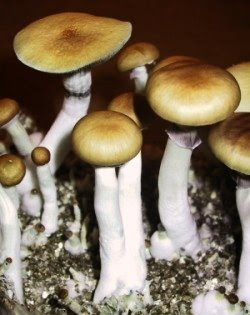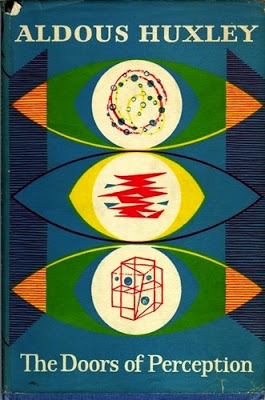Philosophy
 Psilocybin mushrooms
Psilocybin mushrooms

- Strong Gun Laws Work (or, Rather, Weak Ones Don't)
Last week, a man with a concealed carry permit from the state of Virginia shot himself, his mother, and her doctor in Johns Hopkins Hospital because he wasn't pleased with the treatment offered by the top hospital on the planet Earth. Because he thought...
- Jeremy Bentham In The Lab
I've got a colleague who does pain research (and, no, there is no truth to the rumor that my 8 am logic class is one of his experiments). He studies physiological issues related to pain. Where pain is usually the result of an undesirable change to...
- Science, Society, And Lingerie
Two very interesting studies out to show that the naive version of the nature/nurture distinction has no place whatsoever in discussions of human sexuality: Echidne of the Snakes discusses a University of Chicago study comparing the relative happiness...
- Money=happiness?
This is one of the oldest philosophical questions ever asked. "Can money buy happiness? Gallup poll asks, and the world answers" July 1st, 2010 physorg.com A worldwide survey of more than 136,000 people in 132 countries included questions about happiness...
- Onabotulinumtoxina="sour Puss"
I wonder if the researchers considered "baseline mood"? "Researchers suggest Botox can reduce ability to feel emotions" June 24th, 2010 PhysOrg.com Researchers studying the effects of Botox, a chemical used to smooth out facial wrinkles, have found...
Philosophy
Psilocybin...for that metaphysical experience
 Psilocybin mushrooms
Psilocybin mushroomsThe Jolly Green Giant may want to explore the possibilities here...to enhance a metaphysical epistemology accessible to all at the local grocery store. The 60s are back and a positive force in the understanding of the universe. But the Schedule I drug may have many hurdles to jump.
physorg.com:
In a follow-up to research showing that psilocybin, a substance contained in "sacred mushrooms," produces substantial spiritual effects, a Johns Hopkins team reports that those beneficial effects appear to last more than a year.
Writing in the Journal of Psychopharmacology, the Johns Hopkins researchers note that most of the 36 volunteer subjects given psilocybin, under controlled conditions in a Hopkins study published in 2006, continued to say 14 months later that the experience increased their sense of well-being or life satisfaction.
"Most of the volunteers looked back on their experience up to 14 months later and rated it as the most, or one of the five most, personally meaningful and spiritually significant of their lives," says lead investigator Roland Griffiths, Ph.D., a professor in the Johns Hopkins departments of Psychiatry and Behavioral Sciences and Neuroscience.
In a related paper, also published in the Journal of Psychopharmacology, researchers offer recommendations for conducting this type of research.
The guidelines caution against giving hallucinogens to people at risk for psychosis or certain other serious mental disorders. Detailed guidance is also provided for preparing participants and providing psychological support during and after the hallucinogen experience. These "best practices" contribute both to safety and to the standardization called for in human research.
"With appropriately screened and prepared individuals, under supportive conditions and with adequate supervision, hallucinogens can be given with a level of safety that compares favorably with many human research and medical procedures," says that paper's lead author, Mathew W. Johnson, Ph.D., a psychopharmacologist and instructor in the Johns Hopkins Department of Psychiatry and Behavioral Sciences.
The two reports follow a 2006 study published in another journal, Psychopharmacology, in which 60 percent of a group of 36 healthy, well-educated volunteers with active spiritual lives reported having a "full mystical experience" after taking psilocybin.
Psilocybin, a plant alkaloid, exerts its influence on some of the same brain receptors that respond to the neurotransmitter serotonin. Mushrooms containing psilocybin have been used in some cultures for hundreds of years or more for religious, divinatory and healing purposes.
Fourteen months later, Griffiths re-administered the questionnaires used in the first study -- along with a specially designed set of follow up questions -- to all 36 subjects. Results showed that about the same proportion of the volunteers ranked their experience in the study as the single most, or one of the five most, personally meaningful or spiritually significant events of their lives and regarded it as having increased their sense of well-being or life satisfaction.
"This is a truly remarkable finding," Griffiths says. "Rarely in psychological research do we see such persistently positive reports from a single event in the laboratory. This gives credence to the claims that the mystical-type experiences some people have during hallucinogen sessions may help patients suffering from cancer-related anxiety or depression and may serve as a potential treatment for drug dependence. We're eager to move ahead with that research."
Griffiths also notes that, "while some of our subjects reported strong fear or anxiety for a portion of their day-long psilocybin sessions, none reported any lingering harmful effects, and we didn't observe any clinical evidence of harm."
The research team cautions that if hallucinogens are used in less well supervised settings, the possible fear or anxiety responses could lead to harmful behaviors.
Source: Johns Hopkins Medical Institutions
physorg.com:
"Spiritual effects of hallucinogens persist, researchers report"
In a follow-up to research showing that psilocybin, a substance contained in "sacred mushrooms," produces substantial spiritual effects, a Johns Hopkins team reports that those beneficial effects appear to last more than a year.
Writing in the Journal of Psychopharmacology, the Johns Hopkins researchers note that most of the 36 volunteer subjects given psilocybin, under controlled conditions in a Hopkins study published in 2006, continued to say 14 months later that the experience increased their sense of well-being or life satisfaction.
"Most of the volunteers looked back on their experience up to 14 months later and rated it as the most, or one of the five most, personally meaningful and spiritually significant of their lives," says lead investigator Roland Griffiths, Ph.D., a professor in the Johns Hopkins departments of Psychiatry and Behavioral Sciences and Neuroscience.
In a related paper, also published in the Journal of Psychopharmacology, researchers offer recommendations for conducting this type of research.
The guidelines caution against giving hallucinogens to people at risk for psychosis or certain other serious mental disorders. Detailed guidance is also provided for preparing participants and providing psychological support during and after the hallucinogen experience. These "best practices" contribute both to safety and to the standardization called for in human research.
"With appropriately screened and prepared individuals, under supportive conditions and with adequate supervision, hallucinogens can be given with a level of safety that compares favorably with many human research and medical procedures," says that paper's lead author, Mathew W. Johnson, Ph.D., a psychopharmacologist and instructor in the Johns Hopkins Department of Psychiatry and Behavioral Sciences.
The two reports follow a 2006 study published in another journal, Psychopharmacology, in which 60 percent of a group of 36 healthy, well-educated volunteers with active spiritual lives reported having a "full mystical experience" after taking psilocybin.
Psilocybin, a plant alkaloid, exerts its influence on some of the same brain receptors that respond to the neurotransmitter serotonin. Mushrooms containing psilocybin have been used in some cultures for hundreds of years or more for religious, divinatory and healing purposes.
Fourteen months later, Griffiths re-administered the questionnaires used in the first study -- along with a specially designed set of follow up questions -- to all 36 subjects. Results showed that about the same proportion of the volunteers ranked their experience in the study as the single most, or one of the five most, personally meaningful or spiritually significant events of their lives and regarded it as having increased their sense of well-being or life satisfaction.
"This is a truly remarkable finding," Griffiths says. "Rarely in psychological research do we see such persistently positive reports from a single event in the laboratory. This gives credence to the claims that the mystical-type experiences some people have during hallucinogen sessions may help patients suffering from cancer-related anxiety or depression and may serve as a potential treatment for drug dependence. We're eager to move ahead with that research."
Griffiths also notes that, "while some of our subjects reported strong fear or anxiety for a portion of their day-long psilocybin sessions, none reported any lingering harmful effects, and we didn't observe any clinical evidence of harm."
The research team cautions that if hallucinogens are used in less well supervised settings, the possible fear or anxiety responses could lead to harmful behaviors.
Source: Johns Hopkins Medical Institutions

- Strong Gun Laws Work (or, Rather, Weak Ones Don't)
Last week, a man with a concealed carry permit from the state of Virginia shot himself, his mother, and her doctor in Johns Hopkins Hospital because he wasn't pleased with the treatment offered by the top hospital on the planet Earth. Because he thought...
- Jeremy Bentham In The Lab
I've got a colleague who does pain research (and, no, there is no truth to the rumor that my 8 am logic class is one of his experiments). He studies physiological issues related to pain. Where pain is usually the result of an undesirable change to...
- Science, Society, And Lingerie
Two very interesting studies out to show that the naive version of the nature/nurture distinction has no place whatsoever in discussions of human sexuality: Echidne of the Snakes discusses a University of Chicago study comparing the relative happiness...
- Money=happiness?
This is one of the oldest philosophical questions ever asked. "Can money buy happiness? Gallup poll asks, and the world answers" July 1st, 2010 physorg.com A worldwide survey of more than 136,000 people in 132 countries included questions about happiness...
- Onabotulinumtoxina="sour Puss"
I wonder if the researchers considered "baseline mood"? "Researchers suggest Botox can reduce ability to feel emotions" June 24th, 2010 PhysOrg.com Researchers studying the effects of Botox, a chemical used to smooth out facial wrinkles, have found...
